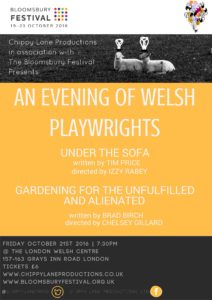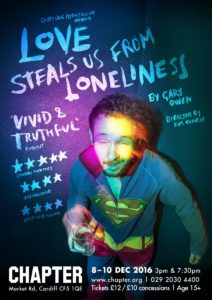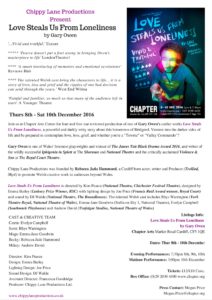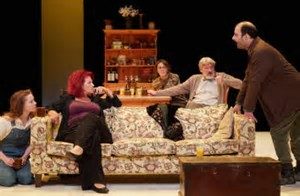
 (5 / 5)
(5 / 5)
Gary Owen and Rachel O’Riordan’s radical reimagining of Chekhov’s classic masterfully transports the narrative of The Cherry Orchard from pre-revolutionary Russia to early 1980’s Britain at the outset of the Thatcher regime. The parallels of the two landscapes, both on the cusp of societal upheaval, provides an apt setting for Owen’s exploration of class equalities, guilt and grief.
At the beginning of the play we meet Rainey, returning to the family home in West Wales and the memories of the son that continue to haunt her. With no money left and the future of their home increasingly uncertain, could an agreement with former tenant Lewis save the property from impending auction?
The one set staging creates an intimacy and surprising relatability between the family and the audience which transcends class preconceptions through the sense of a shared space which we co-inhabit over the course of the 3 hours. The clever use of space enables us to effortlessly join Anya in the Orchard, envisage the view down to the shore and experience the poignancy of Rainey and Dottie’s moment in the grounds. The presence of Josef is hauntingly conjured throughout.
Whilst Richard Mylan and Alexandria Riley provide us with a great deal of the humour throughout, it is Riley’s Dottie who most poignantly captures the extent of the injustices that class inequality can create; for in a society where time is money, who is afforded the luxury of the time to grieve? Juxtaposed with just how detrimental this ‘indulgence’ has rendered Rainey – a decade of alcoholism and guilt – we are left to un-judgingly straddle the vast void between the extremities of each’s experience.
A powerful, thought-provoking piece and one not to be missed.
Cast
Simon Armstrong
Denise Black
Matthew Bulgo
Morfydd Clark
Hedydd Dylan
Richard Mylan
Alexandria Riley
Creative
By Anton Chekhov
A re-imagining by Gary Owen
Director Rachel O’Riordan
Designer Kenny Miller
Lighting Designer Kevin Treacy
Composer and Sound Designer Simon Slater
Casting Director Kay Magson CDG

Get the Chance member Corrine Cox.
Tag Archives: Gary Owen
Review The Cherry Orchard, Sherman Theatre by Kevin Johnson
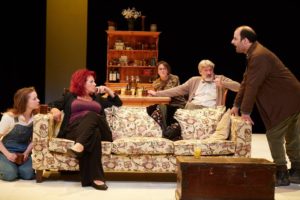
This is not a new version of the Chekhov classic, but a ‘re-imagining’ by Welsh writer Gary Owen, of Killology & Iphigenia In Splott fame. Owen relocates it from 1890’s Russia to the Pembroke coast in 1982, just prior to the Falklands War, which makes for a very interesting choice.
It feels like every dysfunctional family drama you’ve ever seen, until you realise Chekhov originated the idea of real characters, with real problems, talking like real people.
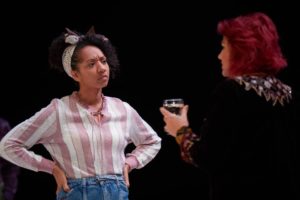
Family matriarch Rainey, who has crawled into a bottle after the death of her son over a decade ago, followed soon after by the suicide of her husband, is virtually dragged back to the family home from London by Anya, her youngest daughter. Her self-destructive lifestyle has lead to the family home on the Pembroke coast being auctioned off to pay the debts.
Val, her eldest daughter, has held things together, but they need Raynie’s permission (and signature) to save it. All agree that the only viable option is to sell off the ancestral cherry orchard for redevelopment, but will she see it that way?
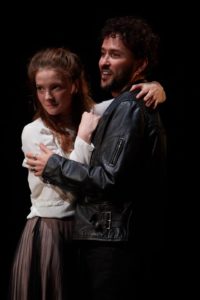
This play is incredibly funny and well-worth seeing, if only for the way Owen makes it so accessible to Welsh eyes. The ‘Russian peasants’ now come from housing estates, the decaying aristocracy are English interlopers, and the Communist revolutionaries are now Thatcherites, sweeping the past away without a thought or concern.
At the heart of the play is the idea that the future is farther away than we hope, while the past is always closer than we’d like. The characters here are continually haunted, not by spirits, but by the ghosts of memories, taunting them with remembrance.
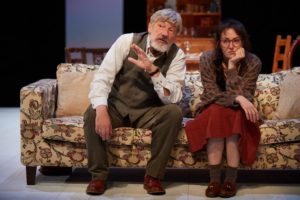
Rainey tries to forget through excess, her guilt at losing her son gnawing away at her, like a rat sown inside her skin. In the end it causes her to take drastic action, and Denise Black brings all this out in a masterful performance that makes you feel sorry for her, even while she’s being a monster to all and sundry.
The entire cast take their moments when offered, yet still make this a true ensemble piece. Morfydd Clark is sweetly sensual as the young Anya, while Hedydd Dylan as her elder sister Val, shows us a woman who tries to run other people’s lives, but fails at her own.
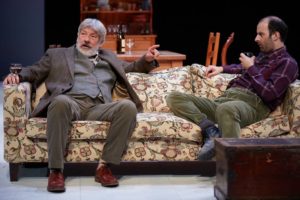
Simon Armstrong as Gabe, Rainey’s brother, is amusingly ineffectual, yet quietly sharp. When Val talks about Rainey not telling him about her plans to leave he replies “We’ve been brother & sister half a century. Through awful things. Do you think saying ‘goodbye’ makes any difference?”
Alexandria Riley gives us a Dottie that is down to earth yet shows the love/hate relationship she has with the family, while Richard Mylan is funny, while also imparting a wise naïveté to Ceri.
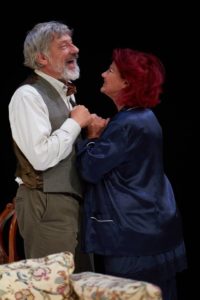
Mathew Bulgo, given the task of Lewis, the ‘poor boy made good’, effects a performance of subtlety that defies the historical villain the role has been seen as. With the insults he endures from the others, and denied the role of ‘family saviour’ by Rainey, it’s hard not to feel sympathy for him.
Writer Gary Owen conveys a situation full of layers, and also offers some nice ironies. Ceri’s expectations of Margaret Thatcher getting the blame for the Falklands War being one, Gabe’s job offer as an investment banker another.
When you add all this to Rachel O’Riordan’s deft direction, Kenny Miller’s intriguingly skewed set, and Kevin Tracey’s ingenious lighting, the Sherman Theatre demonstrates yet again that it is punching well above its weight in the theatre world.
There is so much going on here that I actually re-read the script in one go afterwards, and was still as gripped as I was by seeing it. The play is funny, ironic, witty, sarcastic and quietly heartbreaking. It is a story of loss, of people, places and things, and how memories both haunt and define us.
As F. Scott Fitzgerald once observed: ‘We beat on, boats against the current, borne back ceaselessly into the past‘.
http://www.shermantheatre.co.uk/performance/theatre/the-cherry-orchard/

Kevin Johnson
Top Tunes with Gary Owen
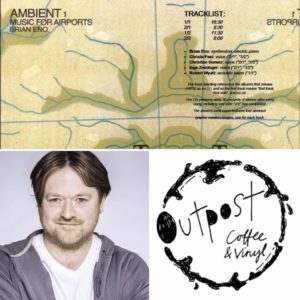
Hi Gary great to meet you, can you give our readers some background information on yourself please?
I’m a playwright. My family are from Pembrokeshire, I grew up in Bridgend, and I live in Cardiff. Mostly recently I’ve written Iphigenia in Splott for the Sherman Theatre, Violence and Son for the Royal Court, and Killology for both the Sherman and the Royal Court. Right now I’m working on a new version of Chekov’s classic comedy The Cherry Orchard, which relocates the play to Pembrokeshire in the very early 1980s. It’ll be on at the Sherman in October.
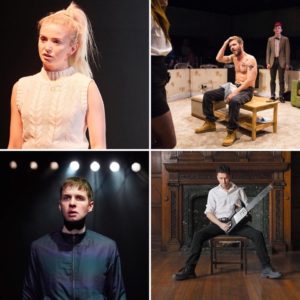
http://www.shermantheatre.co.uk/performance/theatre/the-cherry-orchard/
This chat is specifically about music and the role it has played in your personal and professional life. Firstly to start off what are you currently listening to?
I’ve actually got a playlist called “Just Great Songs!” – with the exclamation mark and everything – and I’m listening to that. Right now it’s playing “In Every Dream Home, A Heartache” by Roxy Music. A title I will almost certainly steal for a play one day. And now it’s playing “Glosh” by Cotton Wolf, from their amazing new album “Life in Analogue”.
We are interviewing a range of people about their own musical inspiration, can you list 5 records/albums which have a personal resonance to you and why?
On any day it could be any of dozens of other records, but for today. I find it almost impossible to work in silence, but at the same time if I’m going to work to music it can’t be too engaging, or it’ll distract me. So I’ve got a whole load of records that are maybe not quite music, or just very low key music, that I put on when I need to work. The top one is Brian Eno’s “Music for Airports”, but I use a lot of his ambient albums, especially “Discreet Music” and “Neroli”.
And then there’s a brilliant album called “Electric Enigma”, which is field recordings some guy made by going out into the desert and sticking up a big antenna so he could record radio noise made by cosmic rays and the solar wind and the Earth’s magnetic field. It’s available for free from the Internet Archive and it’s very beautiful.
https://archive.org/details/ird062
And I’ve got a CD-R called “Buildings”, which is two hours of recordings made by sticking contact mikes to buildings with lifts in them. So it’s two hours of lifts, going up and down buildings. Simon Proffitt gave it to me and I don’t know where he got it from. I worry he made it himself. Anyway it’s gorgeous.
“Bendith” by Bendith. Bendith are a Welsh folk supergroup made up of family trio Plu, together with Carwyn Ellis, mop-topped singer from psychedelic pop wonders Colorama.
They came together to make music mostly about Carwyn’s childhood in Carmarthenshire. There’s a lovely documentary show about the project on iPlayer which features live versions of the songs, and lots of pics of the villages and houses Carwyn’s family lived in, lots of elderly men in barns and sheds in the 1970s, and I’ve got a lot of very similar photos of my family in Pembrokeshire. And the music is so breathtakingly beautiful it stops me in my tracks every time I hear it. Not an album I can work to.
“Fantasia on a Theme from Thomas Tallis” by Vaughan Williams. Vaughan Williams is a deceptive composer in that he seems very catchy and undemanding and writes actual tunes (which is probably why I like him) but there’s a huge melancholy in much of his work (which is probably why I like him). “Fantasia…” was written in 1910 and it is, as its title suggests, a fifteen minute riff on a tune written in 1567 by the Elizabethan composer Thomas Tallis. Aside from being straightforwardly beautiful music, I love it because there is something glorious and heroic about these two men, collaborating across four centuries, together creating something neither could have made alone.
“Night Thoughts” by Suede. I have loved Suede since they and I were skinny indie boys in the 90s. Now they are chiselled indie men and I am a haggard old wreck, but I love them still. “Night Thoughts” is their latest album and I think it might be their best.
https://youtu.be/oeWEW3i_Ldg
It’s nostalgic and sentimental and over-blown and glorious. They made a heart-breaking film to accompany the music that turns the album into what we now call a visual album. I was lucky enough to see a screening of it at Chapter, after which Brett and Mat did a q&a. I couldn’t ask them anything as I was too much of a sobbing mess.
“Jesus’ Blood Never Failed Me Yet” by Gavin Bryars. This is a 70 minute piece based around a loop of a homeless man singing a brief refrain, which Bryars recorded I believe in Elephant & Castle in 1971. And what Bryars did was to build up an accompaniment to the man’s voice – gradually he is joined by brass, strings, layers of harmony and eventually Tom Waits turns up and sings along with him. There’s something profoundly deceitful about it. No-one really took this man and lavished the care and attention and love he deserved on him, as they did on this snatched recording of his voice. So the piece is a comforting lie. And yet – it is irresistible. It is beautiful. I fall for it every time I hear it. In my guts I feel it is a wonderful tribute, even as I think it is a lie.
Just to put you on the spot could you choose one track from the five listed above and tell us why you have chosen this?
“Music for Airports” because I need it to work. But then, it’s not proper music. I could just work next to a lift and have Bendith to listen to. Yes, I’ll probably do that.
Iphigenia in Splott, a conversation in text by Leslie R Herman Jones

This response started as a real text convo between me in NYC and Joel (JF) in our home in Adamsdown, Cardiff. It inspired me to continue in this format. Instead of commenting that the language in the play was strong, and potentially offensive to some audiences, the response enters into the spirit of the drama and uses its vernacular. The other person in this scripted response is my daughter Tillie as TJ, who attended the performance with me. – LJ.
LJ: I saw Iphigenia in Splott in NYC on Wednesday night.
JF: What was it about?
LJ: A drunken slag on Clifton St….
JF: Anyone I know?
LJ: Her world; her straight-talking shit-faced attitude.
JF: Was it set in the Clifton pharmacy getting her methadone fix?
LJ: I said a drunk not a druggie.
JF: Oh….
LJ: Her hopes, fears, delusions… how the world impacts on her and she impacts on the world…
JF: What’s her name?
LJ: Iphigenia. Effie for short.
JF: How did it go down?
LJ: New York is a pretty gritty city, you know…
JF: You would know, born and bred there.
LJ: Yes I would. So, I think they got it. Apart from a smattering of laughs in the right places (but not all the right places), Sophie Melville’s Effie silenced the house throughout with her intimidating, in-your-face performance of this real toughie from Splott, Cardiff. New Yorkers understandably missed a few laughs for which you’d really have to be there to fully appreciate. As well, some of the micro-cultural and geo-specific references may have gotten lost in translation, but overall the impact was powerful.
JF: And you knows your Caadiff, too, innit love?
LJ: Living in the ‘Diff for 35 years and off Clifton Street for ten of them ? I’ve got the T-shirt, love,… with the distinct privilege of calling The Clifton my local…
JF: We’ve seen a bit down the Clifton…
LJ: I’ve definitely avoided the likes of Effie down Clifton Street, the wounded urban warrior, bruised and battered but still standing; spitting and swearing, daring you and scaring you just by staring at you…..
JF: Yep….
LJ: Melville’s impressive performance as Effie clearly kept the audience gripped — holding on tight while she soared (Bar scene) and sank (Birthing scene) and dragged us ducking and diving through the gutter of her frenzied and high-risk out of control life.
JF: Woa! Who wrote the play?
LJ: Gary Owen.
JF: Fair play. Sounds like she did justice to the part.
LJ: She did, though she may have missed some of the nuances of the authentic Splott voice and persona that are thoroughly embedded in Owen’s script, falling just short of the highest highs and the lowest lows possible with such a tragic figure.
JF: Who directed it?
LJ: Sherman Theatre’s, Artistic Director, Rachel O’Riordan. And quite strategically. The simple set (Hayley Grindle) served this small stage. A few chairs scattered randomly, and a light fixture of fluorescent strip lights, some falling off (Lighting Designer, Rachel Mortimer) reflected a cheap and nasty flat above a shop on Clifton Street.
JF: Grunge chic…
LJ: Charting Effie’s movements across the stage was great sport — if you’re into sports and sporting analogies.
JF: Sure, I could be…
LJ: O’Riorden’s tactical staging cleverly anticipated the high points of the story by directing Effie to, say, shift a chair a number of beats beforehand, then having her double back to start a scene in order to arrive at that chair at just the right point, to score!
JF: lol
LJ: And with a pivot or a dart or a scramble across around and through the Cardiff landscape, satisfying-for-natives references to Cardiff landmarks throughout the script, O’Riordan’s use of this minimalistic set, with zero props, demanded that Melville command the space and permitted the beautifully steely script to tell the story.
JF:Sounds like you enjoyed it.
LJ: TJ cried. It was rather sad, but I didn’t cry.
JF:Why didn’t you?
LJ: I suppose it was all a bit too real. Its was so close to real life, it hurt more physically than emotionally. I ached for a while afterwards.
JF: Come back, Cardiff misses you.
LJ: I’ll be back in August.
Iphigenia in Splott played at 59E59, NYC as part of their Brits Off Broadway season, from 9 May to 4 June.
http://www.59e59.org/moreinfo.php?showid=283
BSL, Subtitled Video Review, Killology, Sherman Theatre by Steph Back
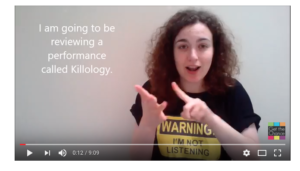
A BSL subtitled video review of Killology. Written by Gary Owen and directed by Rachel O’Riordan performed at Sherman Theatre, Cardiff reviewed by Steph Back.
The production can be seen at The Royal Court ,Thu 25 May – Sat 24 June.
CREATIVE TEAM
By Gary Owen
Director Rachel O’Riordan
Designer Gary McCann
Lighting Designer Kevin Treacy
Composer and Sound Designer Simon Slater
Sound Sam Jones
CAST
Sean Gleeson
SEÁN GLEESON
For the Royal Court: The Weir.
Other theatre includes: The Curious Incident of the Dog in the Night-Time (National/West End); Earthquakes in London (Headlong/National); The Contractor (Oxford Stage Company); In Celebration (Everyman, Chichester); Molly Sweeney (Bristol Old Vic); Aristocrats (Chichester Festival).
Television includes: Midsomer Murders, The Café, Public Enemies, Casualty, Doctors, Dalziel & Pascoe, Burnside, Holby City, Safe House, EastEnders, Underworld.
Film includes: The Last Witness, Cold Mountain, First Knight.
Sean also directs for TV and Film
Richard Mylan
RICHARD MYLAN
Theatre includes: The Believers, Things I Know to be True, Peep Show (Frantic Assembly); Starlight Express (West End); How I Helped Out Communism (Lowry); Crazy Gary’s Mobile Disco (Paines Plough); Badfinger (Donmar).
Television includes: Marked, Byw Celwydd, Agatha Raisin, Waterloo Road, Casualty, Doctors, Grown Ups, My Family, Where the Heart Is, Belonging, No Angels, Coupling, Bad Girls, Wild West, Score, Doctors, A&E, The Bill, Border Café, Silent Witness.
Films include: Don’t Knock Twice, City Rats, Upside of Anger, Love Peace & Pancake, Checkout Girl, Snarl Up, Dead on Time, The Wisdom of Crocodiles.
Radio includes: Look Who’s Back, A Taste of Honey.
Sion Daniel Young
SION DANIEL YOUNG
For Sherman Theatre: Llwyth
Other theatre includes: The Curious Incident of the Dog in the Night-Time (National /West End), Mametz, The Radicalisation of Bradley Manning, House of America (National Theatre Wales); War Horse (National/West End); The Welsh Boy (Theatre Royal, Bath).
Television includes: Hinterland, Our World War, Casualty, Gwaith Cartref.
Film includes: Another Me, Private Peaceful, Daisy Chain.
Radio includes: Hoshiko, Inside Information, Dolls Tea Set, Inside Information, Bisgits a balaclafas.
GARY OWEN (SHERMAN ASSOCIATE ARTIST: WRITER)
For Sherman Theatre: Iphigenia in Splott (& National/ UK Tour/ International Tour), Love Steals Us From Loneliness (& National Theatre Wales), Amgen/Broken, A Christmas Carol
For the Royal Court: Violence & Son.
Other theatre includes: We That Are Left, Mrs Reynolds & the Ruffian, Perfect Match (Watford Palace); Free Folk (Forest Forge); The Shadow of a Boy, Big Hopes (National); Crazy Gary’s Mobile Disco (& Paines Plough), Ghost City (Sgript Cymru); In the Pipeline (& Òran Mór), The Drowned World (Paines Plough); Cancer Time (503); Sk8 (Theatre Royal, Plymouth); Blackthorn (Clywd Theatr Cymru); Mary Twice (Bridgend Youth); Bulletproof (Replay, Belfast); La Ronde, Spring Awakening (Royal Welsh College of Music & Drama).
Television includes: Baker Boys (co-writer).
Awards include:
Meyer Whitworth Award, The Shadow of a Boy;
George Devine Award, The Shadow of a Boy;
Fringe First Award, The Drowned World;
Pearson Best Play Award, The Drowned World;
UK Theatre Award for Best New Play, Iphigenia in Splott;
James Tait Black Prize for Drama, Iphigenia in Splott;
Gary is Associate Artist: Writer at Sherman Theatre and is a Creative Associate at Watford Palace Theatre.
RACHEL O’RIORDAN (DIRECTOR)
Rachel is the Artistic Director of the Sherman Theatre.
For Sherman Theatre: The Weir (& Tobacco Factory Theatres), Bird (& Royal Exchange Theatre), The Lion The Witch & The Wardrobe, A Doll’s House, Iphigenia in Splott (transfer to The National / UK Tour / International tour), Romeo & Juliet, Arabian Nights.
Other Theatre includes: Macbeth (& Tron), The Seafarer (& Lyric, Belfast), The Odd Couple – Female Version, Moonlight & Magnolias, Someone Who’ll Watch Over Me, Twelfth Night (Perth); Unfaithful (Traverse); The Absence of Women (Tricycle); Hurricane (West End/Off-Broadway); Everything Is Illuminated (Hampstead); Miss Julie, Animal Farm (Peter Hall Company/Theatre Royal, Bath); Absolution (Guna Nua/First Irish Festival NY); Much Ado About Nothing, The Glass Menagerie, Merry Christmas Betty Ford (Lyric, Belfast); A Christmas Carol, Gates of Gold, Grimm Tales (Library, Manchester); Over the Bridge (Green Shoot/Waterfront Hall, Belfast); Protestants (Soho); Arguments for Terrorism, Cold Turkey at Nana’s (Òran Mór).
Opera includes: NI5 (Northern Ireland Opera/MAC, Belfast).
Awards include:
Critic’s Award for Theatre in Scotland for Best Director, The Seafarer;
First Irish Theatre Festival Award for Best Director, Absolution;
Rachel was formerly Artistic Director at Perth Theatre.
Democratising Culture from Bridgend to Brazil Catherine Paskell
“And you said something
you said something stupid like
love steals us from loneliness
happy birthday, are you lonely yet?”
It’s now six years since Gary Owen’s play Love Steals Us From Loneliness was commissioned and performed in National Theatre Wales’ inaugural production year of 12 shows in 12 months in 12 places all across Wales. The production was staged in Hobo’s, a nightclub in Gary’s hometown of Bridgend in October 2010. It was my second year as a founding member and Creative Associate of Wales’ English-language national company. I had directed the 5th show in National Theatre Wales’ first year: The Beach, an interactive theatre game on the beach at Prestatyn in July 2010. I also created artistic and community debate-and-response programmes, including our New Critics scheme that supported emerging writers to develop their critical writing through mentoring, workshops, feedback and a conference.

I was really excited to see Gary’s new play: a strong drama that responded intelligently to the ubiquitous reporting at the time of Bridgend county’s suicide incidents. The creative team and wider National Theatre Wales company members worked with artists and young people in Bridgend to investigate and tell the truthful local stories. We partnered with Guy O’Donnell, who at that time was Arts Projects Officer for Bridgend County Council, to spread the learning of the New Critics scheme and offer similar training to young people through Bridgend County Council arts projects. We delivered critical writing workshops for Bridgend’s young people so they could have a greater range of writing tools to respond to their first show, happening on their doorstep: Love Steals Us From Loneliness.
https://youtu.be/nVko_BfsjsY
From these first collaborations, the Young Critics movement in Wales was born. Guy worked to engage more young people, firstly across Bridgend county and then across South Wales and more widely across the nation. National Theatre Wales provided more support through workshops and feedback from our own New Critics, especially Ben Bryant who was being mentored by Lyn Gardner and wanted to share his learning more widely. The Young Critics membership grew and structured its own bespoke programme, engaging with more arts and cultural organisations to provide greater access to exhibitions and open rehearsals, tickets to performances and interviews with artists. Conversations and critiques about creative performance, arts and culture sprang up online, in blogs, in videos, on social media: we heard voices talking about the arts that were different than those we had heard over the past years. The Young Critics scheme always had the learning and experiences of the young participants at its heart; from these experiences, many young critics became young artists, who are now engaging in the arts world in a different way, as emerging directors, writers, actors, producers and other creative practitioners. Young Critics opened the artistic world to make myriad experiences, jobs and roles more visible and more attainable.
I remember a teenager in one Bridgend workshop talking to me about how I became a theatre director. I talked about my training, my life experiences; she told me about her passions and what she was up to. Three years later, she interviewed me as a Young Critic about my directing process during rehearsals for my production for Dirty Protest, Parallel Lines by Katherine Chandler. She said she was thinking about being a theatre director, and these interviews and seeing and talking about work were all helping her development. This young woman was Chelsey Gillard, who two years after this interview became an emerging director with The Other Room pub theatre in Cardiff and is now a young director in her own right.
The Young Critics’ collegiate approach has influenced the professional theatre scene in Wales. The Young Critics created the first ever Theatre Critics of Wales Awards in 2013. They invited professional theatre critics from Wales to join them in nominating and voting. The ceremony was open to all: a joyful celebration of Welsh performance and growing arts analysis voiced by young people. In 2014, the production I had directed for Dirty Protest – Parallel Lines – won the Critics’ Choice Award for Best Production in the English Language. For the first time I could remember, because the Young Critics scheme had opened up arts criticism to more than a few privileged voices, I needed more than two hands to count the number of reviews and critical blog posts the show received. I was thrilled to win the award not just because I was proud of the show and the team; the awards ceremony seemed to show a turning point in democratizing Welsh arts culture and criticism, as smaller project-funded companies were celebrated (and won more awards) than the larger core-funded portfolio organisations.
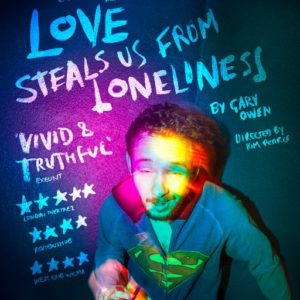
It’s two years later, and a new production of Love Steals Us From Loneliness opens at Chapter in Cardiff this week, the first production created by new company Chippy Lane Productions. The Young Critics scheme has merged with the Third Act Critics (for older people) and Community Critics Wales for critics aged 25-50 years and now all three projects operate under the umbrella of host organisation Get The Chance to engage even more people to see, participate in and write about arts and culture. Arts and cultural organisations ensure a seat for members at productions, alongside the national newspapers and TV journalists.
The Young Critics and Get the Chance are at the forefront of a movement towards democratisation of arts production and cultural criticism. Wales has a strong history of DIY arts activity, from choirs to theatre to craft. Digital and online media platforms mean that now more people can create and distribute art and cultural criticism. It’s very hard to make a living from arts criticism as newspapers close the few positions they have and digital distribution is largely unpaid. There are debates around whether opening up these fields to more people strengthens or dilutes the work.
I suggest that in line with American public radio host Ira Glass’ comments on creativity, when we all start out with creative endeavours, no matter our age, we get better the more experience we get through practicing, rehearsing and doing:
“Nobody tells this to people who are beginners, I wish someone told me. All of us who do creative work, we get into it because we have good taste. But there is this gap. For the first couple years you make stuff, it’s just not that good. It’s trying to be good, it has potential, but it’s not. But your taste, the thing that got you into the game, is still killer. And your taste is why your work disappoints you. A lot of people never get past this phase, they quit. Most people I know who do interesting, creative work went through years of this. We know our work doesn’t have this special thing that we want it to have. We all go through this. And if you are just starting out or you are still in this phase, you gotta know its normal and the most important thing you can do is do a lot of work. Put yourself on a deadline so that every week you will finish one story. It is only by going through a volume of work that you will close that gap, and your work will be as good as your ambitions. And I took longer to figure out how to do this than anyone I’ve ever met. It’s gonna take awhile. It’s normal to take awhile. You’ve just gotta fight your way through.”
If anything is to be new, it’s got to be allowed to be different, or not as good as our ambitions want it to be, when we first start out. That’s how we create new things and make change happen.

It’s an issue that I reflected on whilst directing theatre in Brazil earlier this year. I created a new production of The Merchant of Venice for Shakespeare400, relocated to Belo Horizonte. Professional full-time actors in Brazil are rare; most performers are poorly paid and rehearse in the evenings only over a period of 9 months because they need full-time day jobs to live. The ensemble cast were chosen for their talent and their diverse mix of ages, backgrounds, religions, political leanings, class, race, gender, sexuality. Some of them almost didn’t audition because Shakespeare is seen as an elite theatre form in Brazil; it wasn’t something they are normally allowed to make. Through rehearsals, their barriers came down and their confidence grew. They made Shakespeare belong to them, they owned it, they spoke the language in their own voice, and reflected on their contemporary experiences through a 400-year old story. This was radical theatre in Brazil.

The critics and cultural analysts responded: we had TV, newspaper and online interviews, photo shoots, blogs, articles and previews in the lead up to the first night, and this generated queues of audience members snaking around the building to see the show. But after opening night – nothing. No reviews whatsoever. Critical arts culture just does not exist in the same way as we know it in Brazil. Arts journalists exist to preview and promote high profile art, they are almost a “what’s on” guide.
For a richly diverse culture, theatre production and arts criticism in Brazil is largely homogenous. The same voices are heard through the same networks. New productions and new critical avenues are opening up slowly. Culture is seen as democratic, as the population are keen dancers, singers, sportspeople and other cultural consumers, notably through annual Carnival celebrations and samba competitions. But hierarchies within social, educational and cultural structures mean that most people don’t have access to high art, like Shakespeare theatre performances. In a country of extreme gaps between poor and rich, with corrupt politicians and police forces, where violent crime is experienced daily and the legacy of slavery is omnipresent, there are big debates about ownership of stories and arts, and who has the right language, means and background to participate and comment.

Just as the UK’s media responded to the young suicides in Bridgend by creating a distorted narrative that didn’t reflect reality, this happens daily to young people from poor backgrounds in the favelas and slums of Brazil, as their regional and national newspapers misrepresent them. Just as Bridgend needed a different story at the time of Love Steals Us From Loneliness, so do many people across the world who are not permitted to tell their own stories.
In Wales we run the risk of a homogenised culture if we don’t allow new voices and faces to come through arts. The Young Critics scheme and Get the Chance are providing an avenue to support these voices to be heard on a validated platform, alongside professional and already-respected individuals. I hope the new updated production of Love Steals Us From Loneliness shows us how Bridgend has changed since 2010, leaving those news reports of the time far behind. I have certainly witnessed the creative scene in Wales change in that time, thanks to the activities of National Theatre Wales, the Young Critics and the many, many arts projects run by creative people and organisations across the nation, as well as those Welsh artists and companies who have raised the profile of Welsh arts outside the country through touring and co-productions.
As a theatre director, I want to share my experience, passion and any privilege I have as a cultural leader in Wales to support and elevate others. Democratising arts and critical response is vital to hear more voices, understand others’ perspectives, imagine alternative possibilities and create change. This was the aim of my work with National Theatre Wales when Love Steals Us From Loneliness was first produced, and six years later, although we have made positive advances, the current political climate towards bunkered populism means a fight for democracy, diversity and pluralism is even more vital than ever. The arts world in Wales mustn’t bunker down ourselves, close ourselves off through fear of losing resources, risk quality, or become responsive service providers for ‘customers’ or ‘users’. We need the vision to lead, democratise and share, so that through elevating others we elevate everyone and ourselves.
An Interview with Rebecca Jade Hammond, Artistic Director of Chippy Lane Productions
Photographic Credit Kirsten McTernan
Our project coordinator recently spoke to Rebecca Jade Hammond Artistic Director of Chippy Lane Productions
Hi Rebecca, great to meet you, your company Chippy Lane productions has the mission statement of;
“Our primary mission is to promote Welsh writing and Welsh talent to audiences beyond Wales. We aim to achieve this by producing work across both the live and recorded arts.”
I wonder if you can tell me how you work towards achieving these aims?
“We do this in a number of ways;
- By consistently keeping abreast of published Welsh playwrights work and progression.
- Encouraging new writing and work from emerging Welsh playwrights.
- Social Media/events/building communities of like minded Welsh and Welsh-loving people beyond Wales.
- Expanding our events to include rehearsed readings, socials, scratch nights, fundraising evenings as well as performances.”
Following on from those objectives then your company has recently produced a new scratch night to showcase Welsh writing called “Chippy & Scratch” at The London Welsh Centre and “An Evening of Welsh Playwrights” for The Bloomsbury Literary Festival. Phew you must be busy! It sounds like you might be interested in commissioning playwrights and creatives yourself as part of your companies development. Is this something you would like to see happen?
“Yes, and it is one of the main reasons for setting up a twice annual “Chippy & Scratch Night” to seek out new and emerging, fresh Welsh writers who want to progress and take the next steps in bringing their work to the stage. From our most recent event I am currently in talks with potential writers to try and match one of them to a project for 2018, which will be our next project and inspired by the text The Glass Menagerie by Tennessee Williams.”
Your first production to be staged in Wales is “Love Steals Us From Loneliness” by Gary Owen at Chapter Arts Centre in December. Why did you choose this particular play?
“When I set up the company I wanted to create a buzz and to begin my producing portfolio with a real bang. There was no question that I had to begin with the most important and successful playwright to come out of Wales – Gary Owen. The love for his writing is so exciting and he is making a tremendous noise on the London theatre scene with the success of Iphigenia in Splott . His writing is real, raw and has that rarity with most contemporary work to flick from comedic to tragic like the flip of a coin. Love Steals, is by far my favourite piece of his and when I read it for the first time five years ago – I always said “If I ever pluck up the courage to have my own company, I need this to be the first!”
Love Steals Us from Loneliness was first staged by NTW/Sherman Cymru in Hobo’s nightclub in Bridgend Town Centre in 2010. Do you think this play still resonates for today’s audiences?
“Absolutely. I think it’s pretty timeless to be honest. The themes will always be resonant and even though in someways it is aimed at a younger demographic it can still reach further. After all everyone has or will experience, love, loss, grief, and heart ache. Some will battle with sexuality and others will venture down the wrong path or maybe overcome the tragedies in their lives to be successful, happy and content, able to exist and move forward.”
Rebecca you also champion Equality and Diversity in the Arts across the UK. As an activist and committee member for charity Act For Change. How did you become aware of the work of Act For Change and can you give us more information on your work in this area?
“Firstly it affects/has affected me as a female in the arts where women are poorly represented across the board and also as a regional working class Welsh actor. On a wider level it has affected many of my friends and work colleagues who are BAME and working in the industry and it needs to change. The UK is not majority white and English and it hasn’t been for a very long time. AFC was set up in response to an ITV advert run in 2014 “Where Drama Lives” the advert failed to represent any BAME actors and brought together a collective of people across the arts to revolt and campaign for a wider awareness and change to progress diversity and equality across the arts in the UK. Our arts should reflect the society in which we live in – which is diverse and I for one can’t understand why this isn’t currently reflecting across the live and recorded arts. We have a wealth of talent in the UK and opportunity should be available for all who want it. My most recent work for AFC which includes helping with their events and social media was putting into action a fair casting process for Love Steals. I spent four months ploughing through Twitter, Facebook, the internet, spotlight and drama schools to find BAME actors who were authentic Welsh. I’m not going to lie it proved difficult as Wales – doesn’t seem to have many and this is a major concern.”
Are you aware of any barriers to equality and diversity for either Welsh or Wales based artists?
“I went to showcases and performances in and out of Wales to build up a portfolio of actors who were Welsh. Of the 180 that I currently have in my portfolio 35% are BAME and 25% are over the age of 35. Whilst I worked really hard to raise these figures – it isn’t good enough and it’s not from lack of research or trying. I tried to find a fair amount of actors who represented that bracket to go into the casting process, but sadly there wasn’t enough and I’m concerned that it comes from education predominantly.
We need schools to be studying / performing / spreading awareness of stories of BAME communities and we need to take young people to watch these stories being performed. For example The Mountaintop at The Other Room, Cardiff – A teenager of colour might have seen Alexandria Riley’s performance and gone away thinking “Wow – She’s amazing and she looks like me. That story was about a part of my culture, I want to be like her.” Children want to see themselves in the characters in theatre as well as television and film. Give them that, then that seed will grow from a passion to a hobby and then to a potential career giving progression and more diversity in Wales.”
If you were able to fund an area of the arts in Wales what would this be and why?
I would give the funding to primary schools and secondary schools to finance their theatre trips. We need to capture the next generation of creatives at a young age and show them worlds that can only belong on stage and captivate them. Culture them and nurture them to realise the beauty and possibilities of different types of Theatre. By giving them free tickets to the theatre they will experience a different type of education and in light of the wealth of work swelling in and out of Wales at the moment, perhaps they will see a reflection of what they could do or who they could be in those productions.”
And finally what personally excites you about the arts in Wales? Is there a production you have experienced recently that you would like to share with our readers?
“The arts in Wales are changing. It’s not the place I left in 2004, there is wealth and excitement for Theatre that is new, diverse and vibrant. The Other Room, The Sherman Theatre and NTW to name a few are taking enormous leaps producing great work and reaching new audiences and then take this work beyond Wales to engage with other parts of the UK – this is wonderful news.
As for a production I think I would choose the The Weir at The Sherman Theatre. Mostly because it was giving voice to Irish culture and Irish life and that is what I want Chippy Lane to do beyond Wales. Bring a bit of Welsh culture beyond Wales. As an Artistic Director I want to hear as many stories from all around the world as I can and the wonder of Theatre allows you to do that rather beautifully.”
Thanks for your time Rebecca




